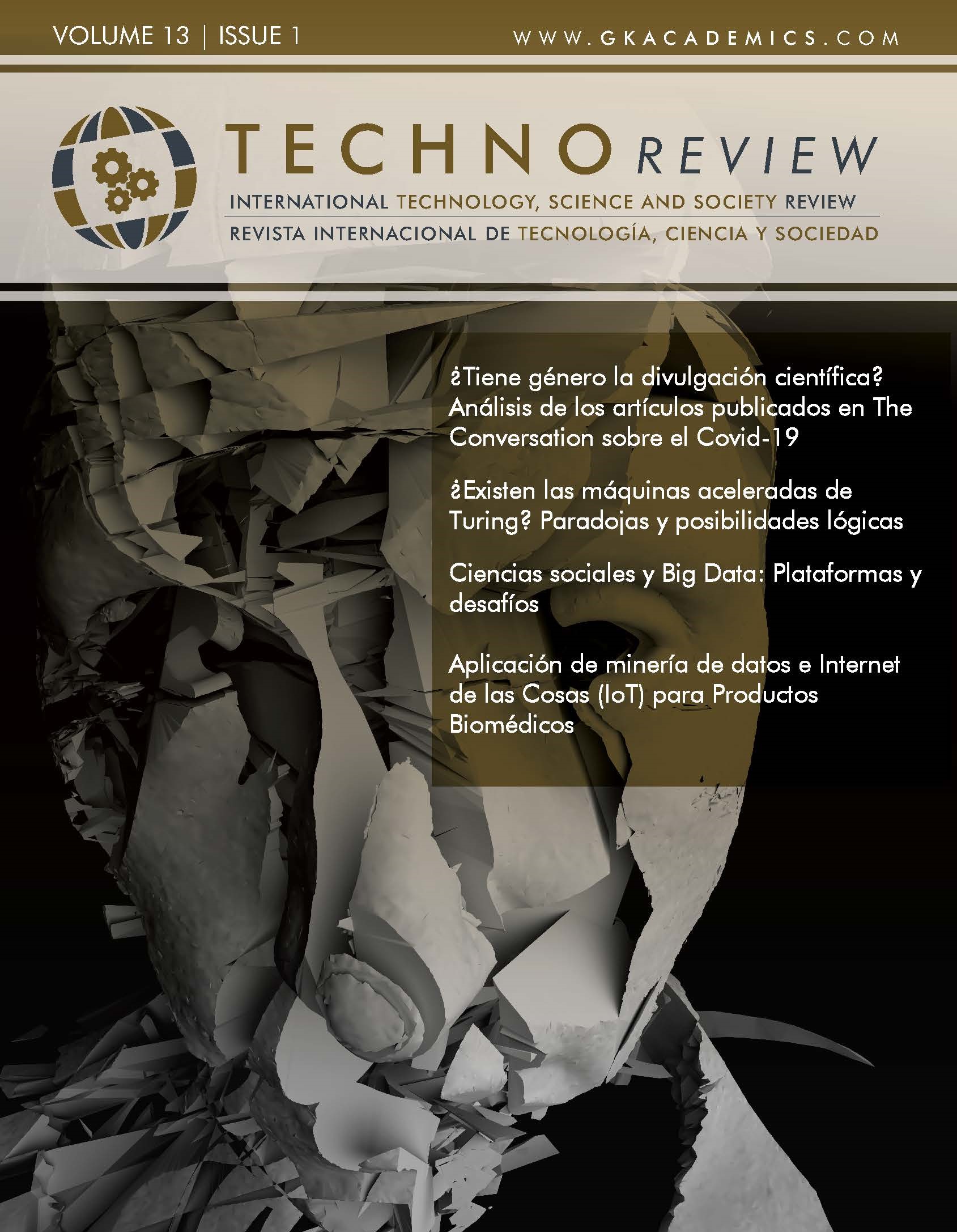Dichotomies of a Gendered Science
A Brief Critical Approach to the Projects for a Feminist Science
DOI:
https://doi.org/10.37467/revtechno.v13.5008Keywords:
Feminist epistemology, Androcentrism, Dichotomies, Successor ScienceAbstract
This paper aims to show the relativistic risks involved in the successor science projects of some feminist epistemologies in terms of preserving the authority and independence that science has had until now. To this end, we briefly present the analyses of the five feminist epistemologies and how they have addressed the problem of the dichotomies present in scientific narratives and discourses, as well as a critical approach to their projects for a new science.
References
Eizmendi-Iraola, M., & Peña-Fernández, S. (2023). ¿Tiene género la divulgación científica? Análisis de los artículos publicados en The Conversation sobre el Covid-19. TECHNO REVIEW. International Technology, Science and Society Review /Revista Internacional De Tecnología, Ciencia Y Sociedad, 13(1), 1–12. https://doi.org/10.37467/revtechno.v12.4513
González García, M. I., Pérez Sedeño, E. (2002). Ciencia, tecnología y género. Revista Iberoamericana de Ciencia, Tecnología, Sociedad e Innovación, Número 2, 1-19. Recuperado el 10 de diciembre de 2022 de https://digital.csic.es/bitstream/10261/9488/1/Ciencia,%20Tecnolog%C3%ADa%20y%20G%C3%A9nero%20-%20Marta%20I.%20Gonz%C3%A1lez%20Garc%C3%ADa%20y%20Eul...pdf
Haraway, D. (1988). Situated Knowledges: The Science Question in Feminism and the Priviledge of Partial Perspective. Feminist Studies, 14(3), 575-599.
Haraway, D. (1989). Primate Visions: Gender, Race and Nature in the World of Modern Science. Routledge.
Harding, S. G. (1993). Ciencia y feminismo. Ediciones Morata.
Juvera, J., & Hernández López, S. (2021). STEAM en la infancia y la brecha de género: una propuesta para la educación no formal. EDU REVIEW. International Education and Learning Review / Revista Internacional De Educación Y Aprendizaje, 9(1), pp. 9–25. https://doi.org/10.37467/gka-revedu.v9.2712
Kass, L. B. (2003). Records and Recollections: A New Look at Barbara McClintock, Nobel-Prize_Winning Geneticist. EnJ. F. Crow & W. F. Dove (Eds.), Perspectives. Anecdotal, Historical and Critical Commentaries on Genetics. Genetics Society of America.
Keller, E. F. (1982). Feminism and Science. Signs: Journal of Woman in Culture and Society, 7(3), 589-602. https://doi.org/10.1086/493901
Keller, E. F. (1985). Reflections on Gender and Science. Yale University Press.
Kuhn, T. S. (1962). La estructura de las revoluciones científicas. Fondo de Cultura Económica.
Longino, H. E. (1987). Can There Be a Feminist Science? Hypatia, 2(3), 51-64. https://doi.org/10.1111/j.1527-2001.1987.tb01341.x
Longino, H. E. (1990). Science as Social Knowledge: Values and Objectivity in Scientific Inquiry. Princeton University Press.
Longino, H. E. (1994). In Search of Feminist Epistemology. The Monist, 77(4), 472-485. https://doi.org/10.5840/monist199477428
Martin, E. (1987). The Woman in the Body. A Cultura Analysis of Reproduction. Beacon Press.
Martin, E. (1991). Egg and Sperm. Signs: Journal of Woman in Culture and Society, 16(3), 485-501. https://doi.org/10.1086/494680
Moya-Díaz, I. ., & De-Juanas, Á. (2022). Percepción del profesorado sobre la igualdad de género y el currículo oculto. HUMAN REVIEW. International Humanities Review / Revista Internacional De Humanidades, 14(3), 1–9. https://doi.org/10.37467/revhuman.v11.4125
Pérez Sedeño, E. (2011). El sexo de las metáforas. ARBOR, 187(747), 99-108. https://doi.org/10.3989/arbor.2011.747n1011
Reichenbach, H. (1938). Experience and Prediction. Phoenix Books. The University of Chicago Press.
Rose, H. (1994). Love, Power and Knowledge: Towards a Feminist Transformation of the Sciences. Indiana University Press
Sánchez, A. (28 de marzo de 1990). La masculinidad en el discurso científico: aspectos epistémico-ideológicos [Conferencia]. Curso Nuevos Enfoques Teóricos y Metodológicos del Programa de Doctorado Mujeres y Sociedad. http://www.ub.edu/SIMS/pdf/MujeresSociedad/MujeresSociedad-12.pdf
Sánchez Reig, D. ., & Turpin Gil, A. . (2022). Un estudio longitudinal y coeducativo aplicado a contextos educativos: Correlación entre legislación y estereotipos de género. VISUAL REVIEW. International Visual Culture Review / Revista Internacional De Cultura Visual, 12(1), 1–14. https://doi.org/10.37467/revvisual.v9.3723
Sanz González, V. (2005). Una introducción a los estudios de ciencia y género. Argumentos de Razón Técnica, 8, 43-66. https://revistascientificas.us.es/index.php/argumentos/article/view/22725
Tacoronte Domínguez, M. J., Santana de la Cruz, M. (2020). Hacia una ciencia redefinida: la propuesta de Helen Longino. Revista Laguna, 46, 27-45. https://doi.org/10.25145/j.laguna.2020.46.02
Published
Issue
Section
License
Copyright (c) 2023 TECHNO REVIEW. International Technology, Science and Society Review /Revista Internacional de Tecnología, Ciencia y Sociedad

This work is licensed under a Creative Commons Attribution-NoDerivatives 4.0 International License.
All articles are published under an Attribution-NoDerivatives 4.0 International (CC BY-ND 4.0) license. Authors retain copyright over their work.

